We all want our furry friends to stay healthy and happy. But sometimes, despite our best efforts, they can get sick or injured. That's why it's important to know the most common reasons your dog or cat will visit the vet so that you can be prepared. While going to the vet can be scary in terms of cost and other unknowns, it's important to remember that your pet's health is always worth the investment.
The most common reason dogs visit the vet is for preventive care, such as vaccinations or routine check-ups. However, other reasons include digestive issues, skin problems, and joint pain. For cats, the most common reasons for visiting the vet are also preventive care and routine check-ups. However, they can also suffer from stress-related issues such as urinary or behavioural problems. With this in mind, let's take a deeper dive into why your dog or cat may visit the vet and other frequently asked questions.
Table Of Contents
- Routine and Preventive Care
- Treatment and Costs for Injuries or Illnesses
- When Should I Take My Dog to the Vet?
- When Should I Take My Cat to the Vet?
- Five Signs You Should Bring Your Pet to the Vet
- Why Are Some Vet Bills Expensive?
- How Can Pet Insurance Help With Veterinary Costs?
Routine and Preventive Care
The most common reasons your dog or cat will visit the vet are for routine and preventive care such as vaccinations and annual check-ups. Vaccinations help protect your pet from diseases, and most pets will need regular vaccinations every 1-3 years depending on the age of your pet. Check-ups are important to make sure your dog or cat is healthy and to catch any problems early. See below for the average costs of some common routine and preventive care services:
- General Office Visit: This is also sometimes called the “exam fee” and is the cost that most vets will charge for the appointment to see your pet. (Avg. Price: CDN $50 - $275)
- Vaccinations: All animals should be vaccinated against common diseases, such as rabies and distemper. (Avg. Price: CDN $70 - $165)
- Parasites: Dogs and cats can be susceptible to parasites, such as fleas, ticks, and worms. If you think your pet may have one of these, it is crucial to have them seen by a vet. (Avg. Price: CDN $50 - $750)
While these are the most common prices for vet visits, remember that they can vary based on factors such as your pet’s breed and size.
Treatment and Costs for Injuries or Illnesses
If your pet becomes sick or injured, it’s important to visit your vet as soon as possible. Providing treatment early can speed up and/or increase the chance of full recovery. The costs of treatment will vary greatly based on the condition, but you can see some estimated ranges for illnesses and injuries below:
- Illness: Signs of illness include vomiting, diarrhea, or lethargy. (Avg. Price: CDN $500 - $7000)
- Injuries: If your dog or cat has been in an accident or has sustained any injury such as a broken bone, it is important to take them to the vet for treatment as soon as possible. (Avg. Price: CDN $2,250 - $6,500)
While the above is more general, the following are the most common issues that may require an unexpected visit to the vet:
- Respiratory Issues
- Digestive Issues
- Urinary Tract Infections or blockages
- Skin problems, including allergies and parasites
- Eye problems
- Ear problems
- Joint pain or arthritis
- Cancer
- Kidney disease
- Diabetes
When Should I Take My Dog to the Vet?
If you're a new dog owner, you might be wondering when the best time to take your furry friend to the vet is. The answer isn't always clear-cut, but there are some general guidelines you can follow.
First and foremost, it's important to establish a relationship with a veterinarian that you trust. This way, you have someone to turn to with any questions or concerns about your dog's health. Once you have a vet in mind, it's a good idea to schedule an initial wellness visit. During this visit, your vet will get to know your dog and go over their medical history. They'll also perform a physical exam and update any vaccinations that may be due.
After the initial wellness visit, it's generally recommended that you take your dog to the vet at least once a year for a check-up, even though they may not be due for any vaccines that year. Of course, if you have any concerns about your dog's health in between visits, don't hesitate to make an appointment. As your dog gets older, your vet may recommend a wellness visit twice a year.
In general, it's best to be proactive when it comes to your dog's health. If you're ever unsure about whether or not you should take your dog to the vet, it's always better to err on the side of caution and go ahead and make an appointment. After all, your furry friend deserves the best care possible!
How Much Does it Cost to Take a Dog to the Vet?
There’s no one answer to this question, as the cost of taking your dog to the vet can vary depending on a number of factors. These can include the type of treatment your dog needs, the location of the vet, and whether or not you have pet insurance.
That said, there are some general ranges you can expect to pay for common services at the vet. For example, a routine check-up will likely cost between $50 and $275, while more extensive treatments (such as surgery) can easily run into the thousands of dollars.
The best way to get an accurate estimate of how much it will cost to treat your dog is to take them to the vet for an evaluation.
When Should I Take My Cat to the Vet?
Regular vet visits are important for your cat’s health and well-being. But how often should you take them? Here’s a guide to help you make the decision.
There are a few things to consider when determining how often to take your cat to the vet. Their age, health, and lifestyle all play a role in how frequently they need to be seen.
Kittens need to go more often than adult cats. They should visit the vet every two to four weeks during their first few months of life. Most veterinarians recommend that kittens be seen at 8, 12, and 16 weeks of age as this is when they receive their monthly vaccine boosters. This also allows the vet to monitor their health and development to catch any potential early life problems sooner.
Adult cats should visit the vet at least once a year for a wellness exam. If they have any health concerns, they may need to be seen more often. Senior cats, those over the age of seven, should visit the vet every six months.
Cats with chronic health conditions or who take medication may need to be seen more frequently, your vet will be able to provide the best recommendation based on your cat’s condition.
How Much Does it Cost to Take a Cat to the Vet?
The cost of taking your cat to the vet can vary depending on a number of factors, including the type of appointment, the reason for the visit, and your location. A routine check-up or vaccination appointment may cost less than an emergency visit or procedure.
Generally speaking, the cost of taking your cat to the vet for a routine appointment will range from $50 to $250. Emergency visits or surgeries can cost significantly more, sometimes upwards of $1,000.
There are a few ways to help offset the cost of taking your cat to the vet. Many pet insurance plans will cover a large portion of the cost of emergency vet visits. Additionally, some veterinarians offer payment plans or discounts for cash payments.
If you’re concerned about the cost of taking your cat to the vet, be sure to discuss your options with your veterinarian ahead of time. They may be able to provide you with an estimate for the cost of the appointment or procedure, as well as suggest ways to help offset the expense.
Five Signs You Should Bring Your Pet to the Vet
If your pet is exhibiting any of the following signs, it’s certainly time to bring them to the vet for a check-up.
- Weight loss without intervention/trying
- Trouble eating or chewing
- Drinking more water than usual or panting consistently
- Urinating more frequently or having trouble doing so
- Showing any signs of pain or discomfort
If you notice any of the signs above or some of these other warning signs in your pet, you should contact your veterinarian to schedule an appointment. The sooner you catch an issue, the easier it will be to treat.
Why Are Some Vet Bills Expensive?
There are a number of reasons why going to the vet can be expensive. First off, vets go through extensive education and training in order to provide the health care needed for our furry families. Additionally, the quality of care for our pets has significantly improved over time, rivalling the health care available to humans. This includes the sophistication of medical diagnostics, including imaging and laboratory tests, as well as the complexities of the surgical procedures available and the effectiveness of therapeutic and preventive drugs for our pets. Also, hospitals are fully staffed with highly trained veterinarians and support staff, sometimes 24hrs a day in the case of emergency facilities.
All these factors contribute to the costs of veterinary medicine which operates as privatized medicine and not socialized medicine provided in Canada. Human health care costs in Canada consume 50% of every tax dollar collected by our government.
Veterinarians provide a valuable service that can often be lifesaving. They are trained to solve a variety of animal health conditions, which can improve the quality of life for both pets and their owners. When you consider the value of this service, the cost of veterinary care reflects the value it provides to us as caring pet parents.
How Can Pet Insurance Help With Veterinary Costs?
Pet insurance is quickly growing in popularity within Canada as the cost of pet insurance comes with many benefits for both pet owner and their pet.
Value to Pet Owner
- Transfers costs of unexpected illness or accident to the insurance company, allowing pet owners to more easily budget for their pet’s future unexpected medical care
- Ability to make the medical decision that is in the best interest of their pet
- Removes the pain of economic euthanasia
- Provides peace of mind
Value to Pet
- Receives the highest quality of care recommended by your vet
- Enhances the likelihood of an accurate, timely diagnosis with rapid treatment options
- Lives longer and healthier lives due to proper medical care
Pet insurance is not required by law, but you should seriously consider pet insurance and how it works for your furry family. If you are unsure about whether or not to get pet insurance, you can speak with your veterinarian or contact our Furkin Care Team to discuss your options.
At the end of the day, pet insurance can protect your personal finances by saving you thousands should your pet experience an unexpected accident or illness. Considering this, getting a pet insurance quote is a great place to start. Get your free pet insurance quote in seconds today.


.png?width=554&name=FUR-Blog-Vaccines%20featured%20(1).png)
